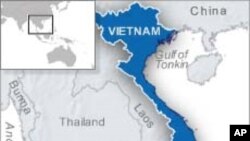As in many developing nations, corruption remains a problem in Vietnam, which a recent report ranks as the fifth-most corrupt country in Asia. Some activists say part of the problem is that many people feel ill-equipped to fight graft.
An annual survey by Political and Economic Risk Consultancy, a Hong Kong consulting firm, indicates that in Asia, only Cambodia, Indonesia, the Philippines and India are more corrupt than Vietnam.
On a scale from 0 to 10, with 10 indicating extreme tolerance for corruption, Vietnam earns a score of 8.3 in the PERC survey this year.
The anti-corruption organization Transparency International ranks Vietnam 116th out of 178 countries in its annual corruption perception index.
Vietnam National Assembly member Pham Thi Loan says people are not turning a blind eye to corruption, but the issue is beyond their reach. She says people are are not tolerant of corruption, but they can not do much about it and they do not know how to prevent it. Loan says corruption is pervasive, so how can they stop it? She says the problem is extremely difficult, so people feel they are incapable of doing anything.
A Vietnamese activist called the “anti-corruption grandmother," Le Hien Duc, echoes that view.
Duc says people are clearly extremely concerned, but they are not well educated and do not know the proper legal procedures to fight corruption. She says they file complaints to the prime minister and other senior officials, because they do not know those officials do not handle the cases directly. She says people draft complaints about corruption, but do not know how to prepare them properly or even how to sign them or where to send them.
The 81-year-old activist, who was honored by Transparency International in 2007 for her anti-corruption fight, calls graft in Vietnam “extremely bad.” She says she has received complaints from 50 of Vietnam’s 58 provincial areas. Duc says not only does corruption exist in land and real estate management, but also is found in education and other sectors as well.
PERC’s latest survey of nearly 2,000 expatriate business executives shows that they think corruption is rampant in communities all over Vietnam.
The government scores 7.50 out of 10 as not being serious in the fight against corruption.
Legislator Loan says Vietnam is experimenting with different measures to fight corruption, but she says it is difficult to get the right balance in the fight.
The PERC report says many factors contribute to corruption in Vietnam, including the fact the public sector is much bigger than the private one, while average government salaries are low. It says the police, the taxation and licensing agencies and the stock market are considered the most corrupt sectors.
In Vietnam, people often give police cash when they are stopped for breaking traffic laws. Loan says it facilitates corruption, but says many people make the payments to get the problem solved quickly.
Loan says they pay the officer because it is easier than going to the authorities to pay a fine, which involves many bureaucratic procedures, and takes time and effort.
Activist Duc sees things differently. She says people with education understand the law, but farmers, workers and others do not, and do not understand that giving cash to police creates favorable conditions for corruption. Duc says state policies and mechanisms should be blamed for letting policemen accept bribes.
The PERC report highlights the case of former Central Bank Governor Le Duc Thuy, who was accused of taking bribes from an Australian company in return for a lucrative banknote printing contract. Vietnamese news media say Thuy retired this month from his position as chairman of the Financial Monitoring Committee.
PERC Executive Director Bob Broadfoot says the incident shows corruption in Vietnam has reached the point that the government must crackdown on prominent cases.
“I do not think it is so much a systematic crackdown on corruption than it is ‘let us make some high-profile examples of it’ because the government does not want to be seen to be corrupt," he said. "The government’s a one-party system and it has to justify its power, and to do that people have to be seeing the government to be fighting corruption.”
In the PERC survey last year, Vietnam ranked third after Indonesia and Cambodia in the list of most corrupt countries in the region, so this year’s ranking is an improvement.




